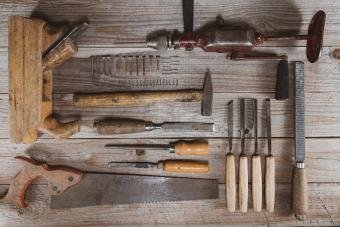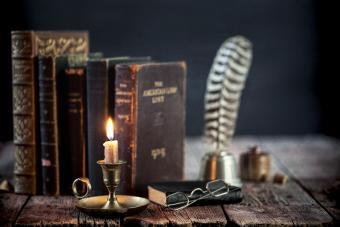
Whether you are an avid collector of antiquarian books, a novice buying your first antique book, or someone that has a few old books with great sentimental value, it is important to know how to store antique books correctly. Proper storage keeps your valuable books in the best condition possible to be enjoyed by generations to come.
Tips for Storing Antique Books
How you store any book can affect its condition and longevity, but storage conditions are particularly important for antique books. That's because the materials in these books are more vulnerable to damage. According to the National Library of Scotland, many older books are printed on ground wood pulp paper. This type of paper has an unusually high content of acid, which means it's more likely to be affected by storage conditions. For example, exposure to light or the wrong kind of bookcase material can increase the acid content and cause the paper to degrade more quickly.
Storing your antique books correctly affects their longevity and future value, so keep these tips in mind, whether you're an antique book collector or simply have a few special volumes.
Consider Bookcase Materials
Bookcases are a classic choice for storing antique books, but take some time to consider the materials used in your bookcase. Choosing between a wooden or metal bookcase is often a decision based on decorating style. However, each of these materials has advantages and disadvantages when it comes to the storage of antique books.
- Wood - Although wooden bookcases help to stabilize the room's humidity, many types of wood secrete substances such as acids. Before using a wooden bookcase to store your books, make sure to thoroughly coat the case with polyurethane lacquer or other similar finish. Allow the coating to dry for at least three weeks before placing your books inside the bookcase.
- Metal - Metal bookcases, such as steel, tend to rust if there is any damage to the finishing layer. If rusting occurs, it may damage or stain the bindings of the books. Powder-coated metal is ideal.
- Glass - A bookcase with glass shelves can be a great choice, as long as the glass is properly supported. Glass does not harm the delicate materials in the books.
If you want to store your books on wood or metal bookcases that might cause contact damage, shelf liners are a great option, according to the Chicago Tribune. Acid-free liners, matte boards, or shelf paper can offer a protective layer between the bookcase and your valuable rare books.
Store Antique Books in a Cool, Dry Place
Where you place your bookcases is important too. The Library of Congress recommends storing books where temperature and humidity won't fluctuate. Rapid changes in humidity or temperature can damage the books. Avoid basements, attics, garages, and any other place where the conditions aren't stable. Bookcases should not be placed against outside walls. Placing them against an outer wall puts the contents of the bookcase at greater risk for damage from condensation and the growth of fungus.
- Temperature - The perfect temperature for antique book storage is between 60-70 degrees Fahrenheit. If the room is kept too dry and hot, the books will become brittle and rapidly deteriorate. Consider the distance of the bookcase from radiators, vents, and other sources of hot or cool air.
- Humidity - Relative humidity of 35% is ideal for storing old books. If the room is too humid and damp, mold will grow.
Avoid All Types of Light

Another important factor to consider is the type and intensity of light in the area where you'll be storing your antique or rare books. The Library of Congress notes that the ideal situation is minimal light exposure. This includes any kind of light. However, it's essential to avoid direct or intense light, whether it's natural or from a lamp or fixture. Direct sunlight and florescent light are especially damaging, since both of these have ultraviolet radiation.
Think About How to Shelve Old Books
Once you have your bookcases picked out and have placed them somewhere that will help preserve your books' beauty and value, it's time to put the books on the shelves. With old books, you can't just stack them any way you like, though. Instead, consider the size of the book, the materials used in it, and a few other factors.
- Book size - Larger folios can be stored flat on a shelf, but they should be no more than three high. Other books should be sorted by size with similarly sized books stored next to one another to provide support.
- Cover materials - Books with leather bindings can be beautiful, but you should not store them next to paper or cloth-bound books. The leather can cause staining in some conditions.
- Position - Store antique books upright at a 90-degree angle to the shelf. This reduces damage that can occur when books lean slightly against one another. If you use bookends, be sure the bookend fully supports the book.
- Crowding - Storing too many books packed tightly together is a bad idea too. Place them so they offer support to one another but do not take any effort to remove from the shelf.
Tips for Handling Antique Books
Books, even antique books, were meant to be handled and read. However, as time passes, these special treasures become fragile with age and require special care in handling.
- Always wash your hands before handling an antique book.
- When you take the book off the shelf, grasp the middle of the spine instead of the top.
- Never eat or drink near an old book.
- Wear white cotton gloves if you are handling a rare book or one with a rare binding.
- Never lay an opened book down with the pages facing the table surface.
Condition Is Part of an Antique Book's Value
Antique book values are directly related to the condition of the books. Old books in beautiful condition will almost always be worth more than the same book in rough shape. How you store an antique book is important for preserving its value, whether it's a rare book worth money or a special volume that has sentimental value for your family.







